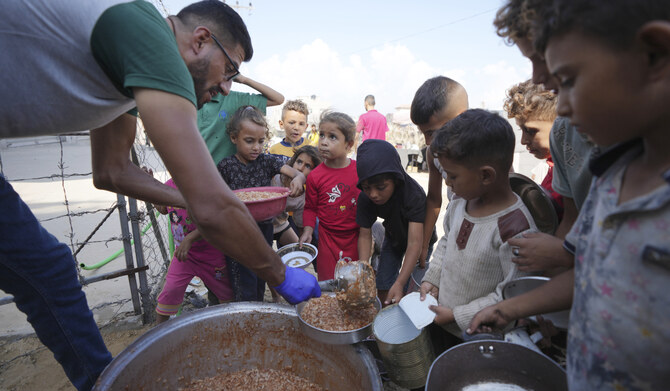GAZA CITY: The killing of Hamas chief Yahya Sinwar brought no respite for Palestinians in Gaza, as Israeli airstrikes and shelling continued unabated in the territory already devastated by more than a year of war.
Raids continued in the besieged enclave in the hours after Israel announced the death of the militant leader they have long accused of masterminding the Oct. 7 attack last year — a key war aim for Israel.
Following a strike at dawn, Gaza’s civil defense agency said rescuers recovered the bodies of three Palestinian children from the rubble of their home in the north of the territory.
“We always thought that when this moment arrived, the war would end and our lives would return to normal,” said Jemaa Abou Mendi, a 21-year-old Gaza resident.
NUMBER
42,500
Palestinians have been killed in Israel’s Gaza onslaught.
“But unfortunately, the reality on the ground is quite the opposite. The war has not stopped, and the killings continue unabated.”
Large swaths of northern Gaza remained under siege by Israeli forces, with road closures preventing the delivery of supplies to the area — despite warnings from the United States that failure to end the blockade could trigger a reduction in arms deliveries to Israel.
“While we hear that delivery of aid will increase, people in Gaza are not feeling any difference,” Philippe Lazzarini, the head of the UN agency for Palestinian refugees, wrote on X.
“They continue to be trapped, hungry, and sick, often under heavy bombardment.”
As news of the death of Sinwar sunk in, many in Gaza saw little reason for the Israeli army to press on with its war in the territory.
“If Sinwar’s assassination was one of the objectives of this war, well, today they have killed Yahya Sinwar,” said Mustafa Al-Zaeem, a 47-year-old resident from the Rimal neighborhood in western Gaza City.
“Enough death, enough hunger, enough siege. Enough thirst and starvation, enough bodies and blood.”
Israel’s campaign to crush Hamas and bring back the hostages has killed 42,500 people in Gaza, the majority civilians, according to data from the Health Ministry in the territory, which the UN considers reliable.
US President Joe Biden said on Friday he impressed upon Israeli Prime Minister Benjamin Netanyahu during a conversation to “also make this moment an opportunity to seek a path to peace, a better future in Gaza without Hamas.”
Pressure has also been mounting in Israel to leverage the killing of Sinwar into a tangible plan to secure the release of the remaining hostages held captive in Gaza.
Israeli President Isaac Herzog and Netanyahu met on Friday to discuss the aftermath of Sinwar’s death, including the hostages.
A statement released by the presidency said that “a significant window of opportunity opened — including the promotion of the return of the hostages and the elimination of Hamas.”
Late on Thursday, Netanyahu vowed that those who helped free the hostages in Gaza would be spared.
“Whoever lays down his weapon and returns our hostages — we will allow him to go on living,” he said.
But in Gaza, some remained skeptical over the fate of the hostages and what any deal would entail for their future.
“Today, Israel is lost and will be searching for the hostages,” said Zaeem.
Others saw little reason to trust Netanyahu and only feared more war.
“What we see is that Netanyahu’s focus is on Gaza — on killing, destruction, and eradication, as the bombings and massacres continue across Gaza,” said Mahmoud Obeid, 42, from northern Gaza.
“What we fear most is the continuation of this cursed war.”


























